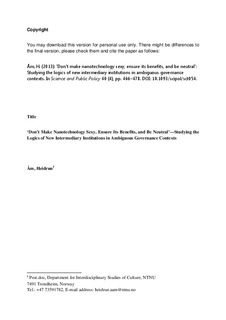‘Don’t make nanotechnology sexy, ensure its benefits, and be neutral’: Studying the logics of new intermediary institutions in ambiguous governance contexts
Journal article, Peer reviewed
Permanent lenke
http://hdl.handle.net/11250/284779Utgivelsesdato
2013-08-04Metadata
Vis full innførselSamlinger
Sammendrag
This paper suggests a new theoretical approach to study intermediary institutions,
particularly intermediary institutions at the science policy nexus. These intermediary
institutions that have a mediating role between science and politics have often been
approached from the perspective of ‘boundary organizations’. But this model, that
incorporates assumptions of principal-agent theory, is not fit for capturing case studies (of
intermediary institutions) in ambiguous governance contexts. I argue that to understand new
intermediary institutions, we need a new theoretical vocabulary to grasp how intermediary
institutions emerge and how they work in practice. For example, discourses such as
‘responsible development of innovation’ can sediment in new institutional settings, including
for example new monitoring and observatory institutions. However, there is a lack of systemic
studies of the material implications that the rise of these new governance actors –such as
intermediary institutions—has for governing emerging technologies. This paper addresses
this gap by analysing the shortcomings of a nanotechnology observatory project. Along the
example of this observatory institution for nanotechnology, I will show that political
discourse theory allows us to explain critically the conditions of possibility for the emergence
of such institutions. Complemented with actor-network theory, these anti-essentialising
approaches help us to see the materiality ofintermediary governance actors.
Beskrivelse
This is the authors accepted and refereed manuscript to the article. Locked until 2015-08-04
